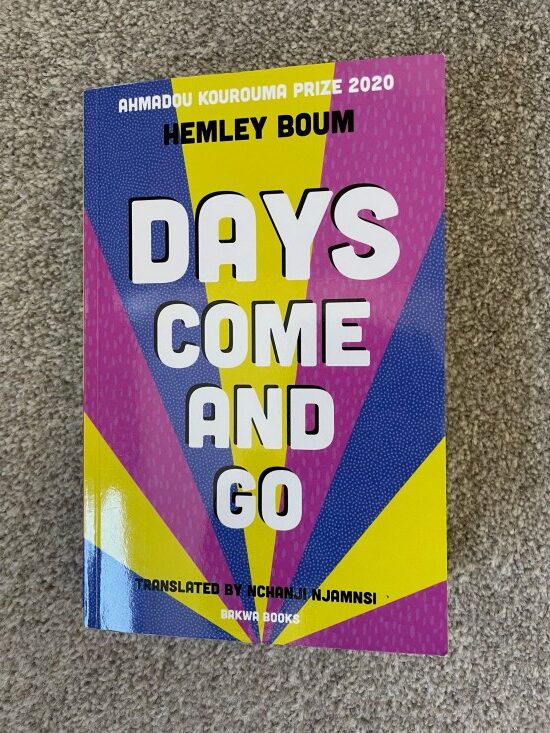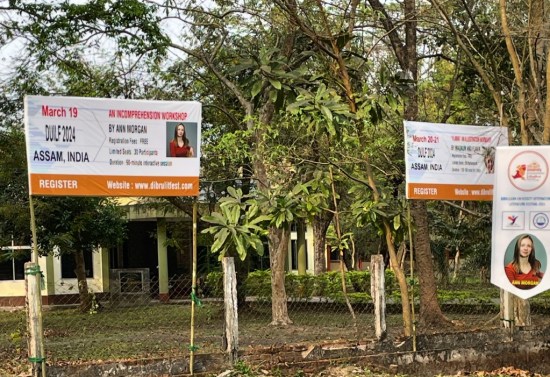This book was given to me by the Cameroonian writer Ernis, who I was lucky to meet in Assam last month. Conscious that I had not read any Cameroonian literature since Peter Green’s translation of Mongo Beti’s 1956 classic Mission to Kala, I asked her what contemporary writing from the country (in addition to her own, of course) I should know about. Her response was to press this novel into my hands.
Days Come and Go by Hemley Boum, translated by Nchanji Njamnsi, is the story of three generations of women navigating a changing and turbulent world. Obliged to accept her daughter Abi’s care as she faces death, the historically aloof Anna reflects back on the events that have led her from Cameroon to Paris, and the education that at once enriched and distanced her from her roots. Abi, meanwhile, must contend with family breakdown and the pressures of caring, while Tina, a friend of her son Max’s back in Cameroon, finds herself caught up in a violent new threat sweeping her home region.
This is a book that disarms with its directness. Boum’s insights and the clarity with which she expresses them through her characters’ voices are startling and winning. Whether it’s the familiar setting of Paris made strange through Abi’s critical gaze or ‘the undeniable, exquisite delight in succumbing to violence and corruption’ that comes through in several of the episodes, there is a frankness to the writing that speaks to the humanity in people everywhere.
Often, this frankness centres on the ruptures caused by colonialism and the imposition of a foreign way of seeing, thinking and learning on a culture that operates by other means. ‘Today, I believe Western knowledge is both simple and despotic,’ states Anna. ‘There is only one God and he is present in church. Education is found only in textbooks. Art is separate from spirituality, confined to specific spaces. The law applies equally to everyone and all values have a price.’
Such thinking jars with the more sensuous, embodied, holistic ways of knowing that used to be common in her home region. ‘Our people never claimed detachment from the world nor dominion over it.[…] We were the world and the world was us: water, wind, sand, the past, the future, the living, the dead… we were all woven into the fabric of the world.’
Falling into the gulf between these two ways of being is a violent experience from which none of the characters in Days Come and Go escape unscathed. Boum makes us feel what this is like, taking us through the stages by which the women are led to conspire in their oppression and suffering so that we seem to live their experiences, from Anna’s grappling with maternal ambivalence and the toll this may have taken on her relationship with her daughter to Abi’s struggle to parent amid marital breakdown.
The most powerful section in the book is Tina’s account of how she and two friends got drawn into the terrorist group Boko Haram. This is an astonishingly insightful and compelling delineation of how people can be made to commit the worst acts, including suicide bombing. ‘Nobody asks a grenade about to explode, “Why?”‘ says Tina. ‘The reason is obvious: it has been unpinned. All they do is pull out our pins and throw us at good people.’
Boum makes us feel how those pins get pulled out. And in so doing, she commits a deeply humane act – making it impossible to ignore the humanity we share with those who do the worst things we can imagine, with all the hope and challenge that comes with this. With this understanding, we can make sense of things that might seem unfathomable to us, such as Tina’s silent appeal to Michelle Obama to stop speaking out against Boko Haram because such well-intentioned, distant activism only makes her tormentors crueller.
Yet an embodied approach to knowing does not mean a reduction in intellectual rigour. This is, in many ways, one of the most erudite novels I’ve read in a long time. It includes critiques of the work of John Steinbeck, Michelangelo and Frantz Fanon – Anna is not a fan of the latter: ‘my disinclination resides in the fact that there are people indeed more invisible than the damned of the earth – their wives.’
This is a novel that walks to a different beat than the sort of writing commonly celebrated in the anglophone literary world. As a result, readers used to mainstream English-language literature may stumble here and there over pacing that will not meet their expectations, and the inclusion or exclusion of certain statements or details. There is also drama-offstage, some declamatory monologuing and various other things traditionally frowned upon on creative writing courses.
And that’s precisely the point. Boum’s storytelling operates by standards other than Western norms, knitting together the emotional, spiritual, physical and intellectual, and presenting these things as a glorious, moving, troubling unity. It is a book of extraordinary range and power. ‘What does a life boil down to?’ asks Anna. This, Boum shows us. This.
Days Come and Go by Hemley Boum, translated from the French by Nchanji Njamnsi (Bakwa Books, 2022)
Source: A year of reading the world



